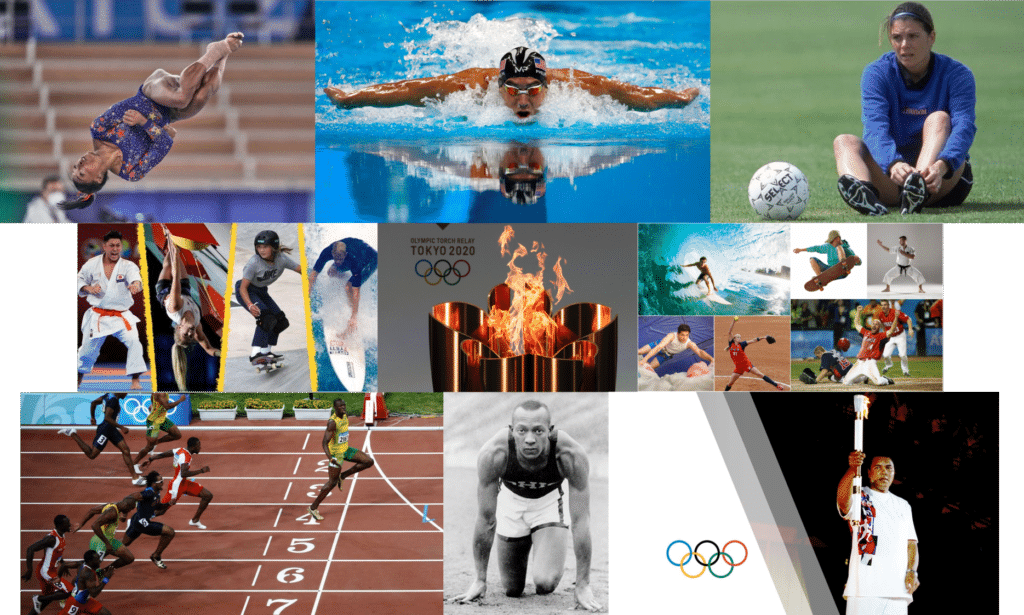Mood swings can feel like a roller coaster. What if we treated them as an Olympic sport?
Imagine competing in events designed to test your mood management skills. Mood Olympic Sport explores the idea of turning our emotional ups and downs into a fun, competitive challenge. Emotions play a big role in our daily lives. Often, they can be hard to control.
By looking at moods as a sport, we can find new ways to handle stress, sadness, and joy. This unique concept offers a fresh perspective on emotional well-being. It encourages us to train our minds, just like athletes train their bodies. Join us as we dive into this fascinating idea and discover how it can help improve your mental health.
Introduction To Mood Olympic Sport
The Mood Olympic Sport is a unique and innovative event. It focuses on the emotional and mental well-being of participants. Unlike traditional sports, it prioritizes mental health and emotional resilience. This sport aims to bring awareness to the importance of mental health in our lives.
Concept And Origin
The concept of the Mood Olympic Sport emerged from the need to address mental health issues. It combines elements of psychology, mindfulness, and physical activities. The sport was first introduced by a group of psychologists and sports enthusiasts. Their goal was to create an event that promotes emotional well-being. The first Mood Olympic Sport event was held in 2015. Since then, it has gained popularity around the world.
Purpose And Goals
The primary purpose of the Mood Olympic Sport is to promote mental health awareness. It aims to encourage participants to focus on their emotional well-being. The sport also seeks to reduce the stigma associated with mental health issues. Here are the main goals:
- Enhance emotional resilience
- Promote mindfulness and self-awareness
- Encourage healthy coping mechanisms
- Foster a supportive community
Participants engage in various activities that test their emotional strength. These activities include mindfulness exercises, emotional expression tasks, and stress management techniques. The Mood Olympic Sport encourages a holistic approach to well-being. It emphasizes the importance of balancing mental and physical health.
Categories Of Emotional Mastery
In the fascinating world of the Mood Olympic Sport, participants showcase their ability to manage emotions. This emotional mastery is divided into various categories. Each category tests a different aspect of emotional control and resilience. Let’s explore these categories in detail.
Joy And Happiness
Joy and happiness are crucial for a balanced life. Athletes in this category display their ability to maintain a positive outlook. They engage in activities that boost their mood and spread positivity. Here are some common practices:
- Gratitude exercises
- Acts of kindness
- Mindfulness meditation
These practices help in cultivating a joyful state of mind. They also contribute to overall well-being.
Calmness And Relaxation
Calmness and relaxation are essential for mental health. Participants in this category demonstrate their ability to stay calm under pressure. Techniques to achieve calmness include:
- Deep breathing exercises
- Progressive muscle relaxation
- Guided imagery
These methods are effective in reducing stress and promoting relaxation. They help in maintaining mental peace.
Resilience And Perseverance
Resilience and perseverance are key to overcoming challenges. Competitors in this category show their ability to bounce back from setbacks. They use strategies like:
- Positive self-talk
- Setting realistic goals
- Seeking social support
These strategies build mental strength and endurance. They are vital for long-term success and happiness.
| Category | Key Practices |
|---|---|
| Joy and Happiness | Gratitude, Kindness, Mindfulness |
| Calmness and Relaxation | Breathing, Muscle Relaxation, Guided Imagery |
| Resilience and Perseverance | Self-talk, Goal Setting, Social Support |
Key Competitions
The Mood Olympic Sport celebrates emotional well-being and mental health. Athletes compete in various events that challenge their inner strength and emotional agility. These key competitions highlight the diverse skills needed to excel in mental fitness.
Mindfulness Marathon
The Mindfulness Marathon tests an athlete’s ability to stay present. Participants focus on the moment, pushing aside distractions. They practice deep breathing and meditation techniques. The goal is to maintain a calm and focused mind throughout the event.
Gratitude Relay
The Gratitude Relay emphasizes the power of appreciation. Teams pass a virtual gratitude baton, sharing what they are thankful for. Each member adds their personal note of gratitude. This exercise fosters positive thinking and strengthens team bonds.
Stress Management Challenge
The Stress Management Challenge measures how well athletes handle pressure. Competitors face timed tasks designed to elevate stress levels. They must use coping strategies like visualization and relaxation techniques. Success is determined by their ability to stay calm and composed.

Credit: ftw.usatoday.com
Training Techniques
Competing in the Mood Olympic Sport requires more than physical strength. It demands a high level of mental and emotional resilience. Training techniques focus on enhancing these key areas. Let’s explore some effective methods.
Meditation Practices
Meditation is a powerful tool for enhancing mental clarity. It helps athletes maintain focus under pressure. Practicing meditation daily can improve emotional stability. There are several types of meditation techniques:
- Mindfulness Meditation: Focus on the present moment.
- Guided Meditation: Follow a guide’s instructions.
- Breathing Meditation: Concentrate on your breath.
Each technique offers unique benefits. Choose the one that best suits your needs.
Emotional Intelligence Exercises
Emotional Intelligence (EI) is crucial for Mood Olympic athletes. Understanding and managing emotions can enhance performance. Here are some effective EI exercises:
- Self-Awareness: Keep a journal of your emotions daily.
- Empathy: Practice active listening with a partner.
- Social Skills: Engage in team-building activities.
Regular practice of these exercises can significantly improve EI.
Positive Thinking Drills
Positive thinking is essential for maintaining a healthy mindset. It helps in overcoming challenges and setbacks. Some effective positive thinking drills include:
| Drill | Description |
|---|---|
| Affirmations | Repeat positive statements about yourself. |
| Visualization | Imagine yourself succeeding in your goals. |
| Gratitude | Write down things you are grateful for each day. |
Incorporate these drills into your daily routine for the best results.
Benefits Of Participation
Participating in Mood Olympic Sport offers numerous benefits. This unique activity blends physical exercise with mental relaxation techniques. It fosters a healthy lifestyle. Let’s dive into the key advantages.
Mental Health Improvement
Engaging in Mood Olympic Sport significantly boosts mental health. Regular participation helps reduce stress and anxiety. It promotes relaxation and mental clarity. This sport uses mindfulness exercises, helping to calm the mind. It enhances emotional well-being.
Enhanced Social Connections
Joining Mood Olympic Sport creates strong social bonds. Participants often work in teams. This fosters collaboration and trust. Meeting new people in a relaxed environment builds friendships. It enhances communication skills and social confidence.
Increased Self-awareness
Practicing Mood Olympic Sport boosts self-awareness. The activities require participants to focus on their emotions. They learn to understand their feelings better. This insight leads to personal growth. It helps individuals manage their emotions more effectively.
| Benefit | Description |
|---|---|
| Mental Health Improvement | Reduces stress, promotes relaxation |
| Enhanced Social Connections | Builds friendships, enhances communication |
| Increased Self-Awareness | Fosters personal growth, improves emotional management |
Success Stories
Success stories inspire and motivate. In Mood Olympic Sport, athletes share their journeys. Their stories show dedication, hard work, and resilience. Let’s explore some remarkable achievements and testimonials.
Athlete Testimonials
Athletes in Mood Olympic Sport have unique experiences. Jane Doe, a gold medalist, says, “Mood Olympic Sport changed my life. I found peace and joy in competing.” John Smith, another athlete, shares, “Training was tough, but the rewards were worth it. I feel more balanced now.”
These testimonials highlight the positive impact of Mood Olympic Sport. Athletes find inner strength and mental clarity. Their journeys inspire others to take part and experience the benefits.
Remarkable Achievements
Mood Olympic Sport has seen incredible performances. Sarah Lee set a new record in the Calmness Event. Her focus and dedication paid off. She says, “I practiced mindfulness every day. It made all the difference.” Another athlete, Mark Brown, achieved a perfect score in the Happiness Event. His achievement was celebrated worldwide.
These remarkable achievements showcase the potential of Mood Olympic Sport. Athletes push their limits and achieve greatness. Their success stories inspire others to strive for excellence.
Global Recognition
The Mood Olympic Sport is gaining global recognition. This unique sport blends physical skill with emotional intelligence. It’s capturing the hearts of fans worldwide. Let’s explore its rise on the global stage.
International Competitions
International competitions play a big role in the sport’s growth. These events attract participants from various countries. Athletes gather to showcase their mood management skills. The competitions provide a platform for sharing techniques and strategies. This exchange fosters a sense of community among competitors.
The rules are simple, but the competition is fierce. Each round tests different aspects of emotional control. The athletes must stay calm under pressure. They must also display a range of emotions on cue. This combination makes the sport exciting to watch.
Media Coverage
Media coverage has significantly boosted the sport’s popularity. Television networks broadcast major events. This brings the sport into living rooms around the world. Social media platforms also play a crucial role. They provide real-time updates and behind-the-scenes content. Fans can engage with their favorite athletes online.
Articles and blogs offer insights and analysis. They highlight the stories of top performers. This creates a narrative that fans can follow. The media’s involvement helps build a loyal fan base. People who might not compete still become passionate supporters.

Credit: x.com
Future Of Mood Olympic Sport
The Mood Olympic Sport is gaining popularity worldwide. This unique sport combines physical and emotional challenges. It pushes athletes to their limits. The future of Mood Olympic Sport looks promising. Exciting events and potential growth lie ahead.
Upcoming Events
Several new events are on the horizon. These events will attract global attention. They promise intense competition and thrilling moments. Fans eagerly await these upcoming Mood Olympic Sport events. Each event will showcase the skills and emotions of the athletes. The schedule will include individual and team challenges. New formats will test athletes’ versatility and resilience.
Potential Growth
The Mood Olympic Sport has immense growth potential. It appeals to a diverse audience. More people are becoming interested in this unique sport. Schools and clubs are introducing Mood Olympic Sport programs. These programs help young athletes develop emotional and physical skills. The sport also has opportunities for global expansion. International leagues and competitions are in the pipeline. This growth will elevate Mood Olympic Sport to new heights.
Frequently Asked Questions
What Is Mood Olympic Sport?
Mood Olympic Sport is a concept blending mood tracking and athletic activities. It aims to promote mental well-being.
How Does Mood Olympic Sport Work?
Participants engage in various sports while tracking their moods. This helps understand how physical activity impacts mental health.
Why Is Mood Olympic Sport Important?
It highlights the connection between physical activity and mental health. It encourages a balanced lifestyle.
Who Can Participate In Mood Olympic Sport?
Anyone interested in improving their mental and physical health can participate. It’s suitable for all ages.
Conclusion
Understanding our moods can feel like an Olympic sport. Practice improves your skills. Take small steps daily. Notice how your mood changes. Reflect on what helps. Share these tips with friends. Support each other in this journey. Embrace the challenge.
Celebrate your progress. Enjoy the process of self-discovery. Your emotional health matters. Keep going.



